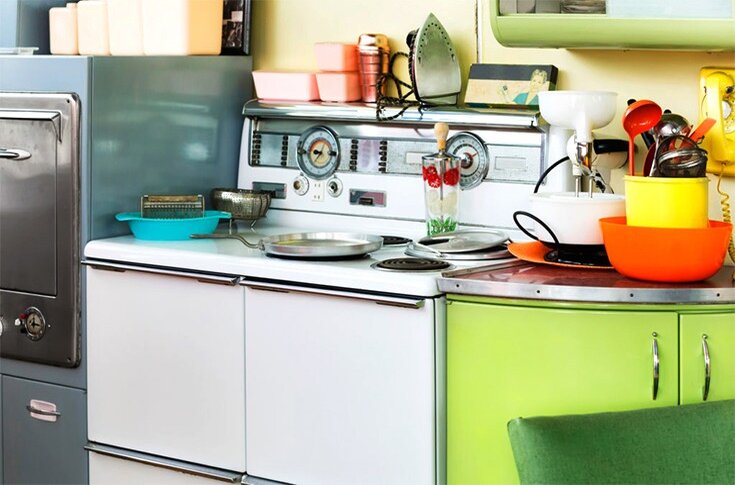We can’t afford anymore to stay without taking action and responsibility for the state of our environment. The only way to really change something is to make small changes that will result in a domino effect.
For that to happen, each individual needs to make changes in their lifestyle for the better good.
Fortunately, we only need to do some small actions to make a big change. With time, they will become a habit and we would be able to safely say that we are really “green”.
How to be More Eco-Friendly in the Kitchen
Switching to a more sustainable lifestyle will help reduce the carbon footprint, which is a global goal nowadays. Another good thing is that you will have great benefits yourself, as this lifestyle can greatly reduce your expenses.
Turning green is undoubtedly healthier for you, and it helps the environment too. When you draw the line, it seems like there is no reason to not try and make your kitchen eco-friendly.
If you are ready to start your journey, here is what you need to do.
Switch to Reusable Storage
 To really be green, you should try and ditch plastic for good. Instead of storing fruit and vegetables in the kitchen in plastic boxes, use glass containers that you can use over and over again.
To really be green, you should try and ditch plastic for good. Instead of storing fruit and vegetables in the kitchen in plastic boxes, use glass containers that you can use over and over again.
Plastic storage containers contain petroleum and other harmful substances that start to be emitted from plastic with time and harm your food. Instead, you can switch to glass which is a lot more durable and will also save you money in the long run.
Instead of purchasing cooking utensils, pans and dishes, you can switch to metal, ceramics, wood, and other sustainable materials that will also last much longer.
Recycle and Repurpose
A large portion of kitchen waste is made up of packaging. You can greatly reduce that amount by carrying your own bag and being careful about the products you choose, but buying packaged food is almost inevitable nowadays.
The best solution, in that case, is to recycle everything we can. Gather plastic, metal, and glass separately and throw them away in the right containers.
When some of the tools you use in the kitchen can no longer function, look for ways to repurpose them, instead of throwing them in the bin.
Use Cloths Instead of Kitchen Paper
It is easy to tear a bit of kitchen paper every time you want to wipe something away, but it’s very far from sustainable. Try to use multiple use sponges and cloths each time you can.
Both nature and your wallet will appreciate that.
Reuse the Food Scraps
Leftover vegetables and other foods leftover from cooking could make a great soup or a stew. There is no need to throw them away when you can make a whole new meal that could feed you for a day or two more.
That will not only help the environment but save you tons of money too.
Even if you don’t use the leftover food scraps for meal prep, you can look up some ways to turn them into a natural soil conditioner for your plants.
Buy Local Produce
The food transportation industry is a huge one, with a huge carbon imprint. Switching to local producers will greatly contribute to sustainability and decrease the harmful emissions related to packaging and shipping.
That is also a good way to contribute to the economy and support local farmers. Learn to eat seasonally and you will always be able to get some fresh local food, free of preservatives that are necessary when food is being shipped.
Purchase in Bulk
 When buying packed foods like pasta, rice, herbs, spices, and others, try buying in bulk as often as you can. You can’t even imagine how much plastic is produced for packaging – it actually comprises 1/3 of the total pollution of our environment.
When buying packed foods like pasta, rice, herbs, spices, and others, try buying in bulk as often as you can. You can’t even imagine how much plastic is produced for packaging – it actually comprises 1/3 of the total pollution of our environment.
Buying in bulk saves some of all that plastic, and if more people do it, it will have a visible effect. Plus, it’s good for your wallet too, only make sure that you are buying quantities you are going to consume. s
Learn how to Compost
There are a few ways to compost in your home if you don’t have a garden, but the easiest of them is to purchase a compostable bin that takes care of the matter for you.
Nearly 70 percent of all the waste we produce in the kitchen can actually be turned into compost. All that is required from you is to purchase the bin and then throw in it any compostable waste as you keep the right proportions of “green” and “brown” types of waste.
Brown waste includes carbon-rich materials like brown cardboard, wood, leaves or straw, and green waste are the materials rich in nitrogen such as kitchen scraps, plants, grass, manure, and others.

My name is Scarlett Mitchell and i am an author and editor in the home topic website – FemCasa.com.
I’m just an enthusiast who wants to share her visions, ideas and advices, when it comes to decorating every part of your home until it becomes the perfect relaxing place for you and your family.

